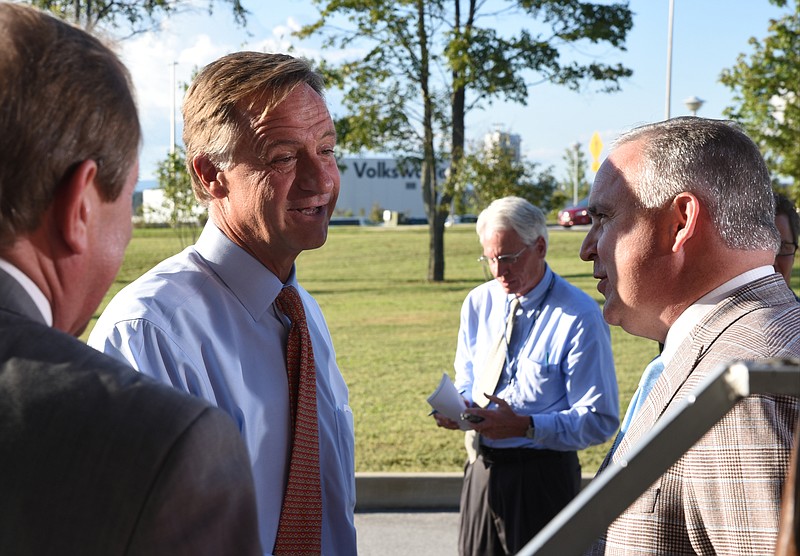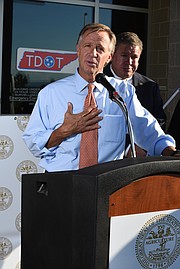VW by the numbers
Plant benefits* $1 billion - Initial capital investment for VW Chattanooga assembly plant announced in 2008* $930 million - VW planned capital investment to add SUV line at Chattanooga factory* 2,500 - Number of existing employees at VW assembly plant* $643 million - Estimated additions to regional economy from VW each year* 12,400 - Estimated direct and indirect jobs created by the VW plant* 2000 - Number of additional jobs VW plans to add over the next two years* 10,000 - Projected employment gains in the region from direct and indirect benefits from VW expansion* $327 million - Projected additional tax revenue from VW expansion in ChattanoogaGovernment assistance* $577.4 million - Government incentives provided for VW for the initial assembly plant project announced in 2008,* $165.77 million - Capital grant to VW from the state of Tennessee for expansion announced in 2014* $52.5 million - Grants for the expansion from the city of Chattanooga and Hamilton County million* $12 million - State grant for training employees for expansion*$33 million - Estimated value of property tax breaks for the expansion over the next decadeClawback standards for VW* VW must add at least 1,600 jobs over three years, starting in July 2020, from its expansion to fully qualify for all of the incentives* Training grants require job to be filled for 24 months* VW must refund government grants, and reduce property tax breaks, proportionate to any shortfall in employment below the 1,600 minimum. If, for instance, it added only 800 jobs, VW would qualify for only half of the incentive payments and would have to refund the rest.Sources: Tennessee Department of Economic Development, Center for Business and Economic Research at the University of Tennessee
Despite the emission-rigging scandal that has stricken Volkswagen, Gov. Bill Haslam said Wednesday he thinks VW's Chattanooga assembly plant can serve as "a central hub" for the German carmaker.
"I still believe, long term, the state has a solid investment," he said after spending about an hour inside the plant and talking with VW officials.
Haslam, speaking at a Tennessee Department of Transportation facility just across Volkswagen Drive from the plant, also said state officials haven't considered renegotiating the huge financial incentives awarded to VW for building the factory and now expanding it.
"There's been no conversation about changing the incentives. It's my hope that VW's vision can still happen," the Republican governor said, backed by seven state legislators from Hamilton and Bradley counties.
Haslam's comments came as VW pulled its application for EPA certification that its 2016 model year diesel vehicles comply with U.S. emissions standards. The diesel cars can't be sold, which means there could be a longer-than-expected wait for those models. VW is trying to come up with a fix to the nearly 500,000 diesel models in the U.S. and nearly 11 million worldwide at the center of the problem.
Karl Brauer, a Kelly Blue Book analyst, told the Los Angeles Times that the announcement "suggests that the fix is probably not going to be easy. It suggests that the fix involves so much challenge that they're not even going to try to make the 2016s work."
About 29 percent of VW's Chattanooga-made Passats are diesel models, according to KBB.
Michael Horn, Volkswagen Group of America's CEO, said in written testimony released prior to an appearance before a Congressional panel today that he knew as early as spring 2014 there was a possible emissions noncompliance with some diesel models that could be remedied.
Later in 2014, he said, he was told that the automaker's technical teams had a specific plan for remedies to bring the vehicles into compliance, and VW was engaged with regulatory agencies about that process.
But last month, the EPA issued a notice of violation based on a determination "that VW manufactured and installed defeat devices" in certain model year Volkswagen and Audi diesel passenger cars.
VW later admitted it installed engine software that sensed when the vehicles were undergoing emissions testing and ensured systems were operating to pass the tests. During normal vehicle use, according to EPA, the software would switch to a different mode that produced emissions of nitrogen oxides from 10 to 40 times above current EPA standards.
Haslam said Thursday that, while at the Chattanooga plant, he saw both the new, refreshed 2016 VW Passat the factory is assembling as well as the planned sport utility vehicle, on which production is to start in late 2016.
"We're married to them," he told reporters about VW. "We want this plant to be a success."
The governor also said he has talked with EPA Administrator Gina McCarthy about VW and how key the plant is to the region.
Haslam said VW officials met with most of its Chattanooga workforce in an all-teams meeting, with plant CEO Christian Koch telling the employees to focus on doing their jobs.
Tennessee House Majority Leader Gerald McCormick, R-Chattanooga, said he was impressed with leadership Koch showed.
McCormick said the state's incentives in VW's Chattanooga plant had to be made or the factory would have gone to another state.
Tennessee government provided an estimated $358.2 million of the original $577.4 million in incentives that persuaded Volkswagen in 2008 to locate its plant in Chattanooga to make the Passat sedan. Local governments provided the remaining $219.2 million.
And this year, Tennessee, Chattanooga and Hamilton County governments committed to more than $260 million in incentives for a new line of SUV production. About $165 million of that is from the state.
The company has set aside more than $7 billion to address the alleged EPA violations, and VW's new CEO in Germany said it is reviewing all investment worldwide to see what could be postponed or cut.
Horn apologized for the scandal, which he called "deeply troubling.
"I did not think that something like this was possible at the Volkswagen Group," Horn said in his prepared remarks to be delivered today to the House Energy and Commerce oversight committee. "We have broken the trust of our customers, dealerships, and employees, as well as the public and regulators."
VW is investing $600 million to expand the plant to produce the SUV, and it plans to hire about 2,000 more workers to join the 2,500 which now are employed there.
Contact Mike Pare at mpare@timesfreepress.com or 423-757-6318.


